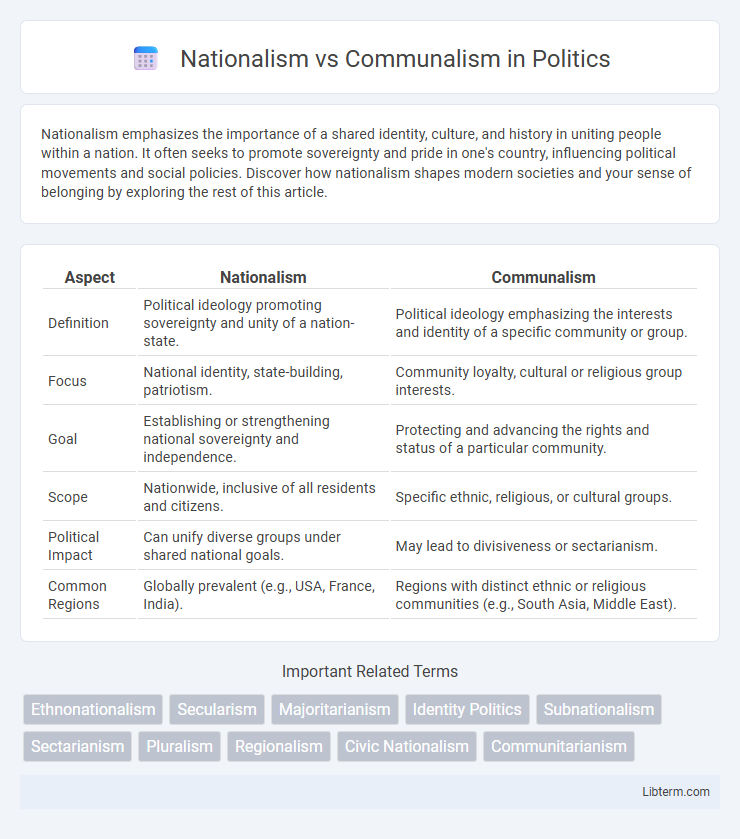Nationalism emphasizes the importance of a shared identity, culture, and history in uniting people within a nation. It often seeks to promote sovereignty and pride in one's country, influencing political movements and social policies. Discover how nationalism shapes modern societies and your sense of belonging by exploring the rest of this article.
Table of Comparison
| Aspect | Nationalism | Communalism |
|---|---|---|
| Definition | Political ideology promoting sovereignty and unity of a nation-state. | Political ideology emphasizing the interests and identity of a specific community or group. |
| Focus | National identity, state-building, patriotism. | Community loyalty, cultural or religious group interests. |
| Goal | Establishing or strengthening national sovereignty and independence. | Protecting and advancing the rights and status of a particular community. |
| Scope | Nationwide, inclusive of all residents and citizens. | Specific ethnic, religious, or cultural groups. |
| Political Impact | Can unify diverse groups under shared national goals. | May lead to divisiveness or sectarianism. |
| Common Regions | Globally prevalent (e.g., USA, France, India). | Regions with distinct ethnic or religious communities (e.g., South Asia, Middle East). |
Understanding Nationalism: Definition and Core Principles
Nationalism is a political ideology centered on the shared identity, culture, language, and history of a nation, emphasizing sovereignty and self-governance. Its core principles include patriotism, national unity, and the promotion of national interests above external influences. Nationalism often seeks to foster social cohesion and collective pride, aiming to preserve and strengthen the nation-state.
Communalism Explained: Origins and Key Characteristics
Communalism originates from socio-political divisions based on religion, ethnicity, or cultural identity, often leading to group-based loyalties and conflicts. Key characteristics include prioritizing communal identity over national unity, fostering exclusive group interests, and promoting collective rights within specific communities. Unlike nationalism, which emphasizes unity and patriotism, communalism frequently amplifies sectarianism and social fragmentation.
Historical Context: Nationalism and Communalism in Practice
Nationalism historically fostered unity and nation-building by emphasizing shared identity and sovereignty, seen in movements like Indian independence led by figures such as Mahatma Gandhi. In contrast, communalism often emphasized religious or ethnic divisions, sometimes resulting in conflict as exemplified by the partition of India and Pakistan in 1947. The clash between these ideologies shaped political dynamics, impacting governance, social cohesion, and conflict resolution in diverse societies.
Impact on Societal Unity and Division
Nationalism fosters societal unity by promoting a shared identity and collective pride based on common culture and history, which strengthens social cohesion and national solidarity. In contrast, communalism often exacerbates divisions by emphasizing religious, ethnic, or sectarian identities, leading to social fragmentation and intergroup conflicts. The impact of nationalism tends to consolidate a unified national community, whereas communalism can undermine social harmony and provoke polarization within society.
Political Movements: Nationalism vs Communalism
Nationalism promotes the unity and integrity of a nation-state based on shared identity, culture, and political sovereignty, often emphasizing patriotism and national pride as key elements. Communalism, in contrast, centers on allegiance to a specific religious, ethnic, or cultural community, sometimes leading to social fragmentation and conflict within a pluralistic society. Political movements driven by nationalism seek centralized nation-building and state cohesion, whereas communalism-based movements prioritize group interests, frequently resulting in identity-based mobilization and communal tensions.
Influence on Social Identity and Group Behavior
Nationalism fosters a unified social identity by promoting allegiance to a nation-state, often emphasizing shared culture, language, and history, which strengthens in-group solidarity and collective pride. Communalism, on the other hand, centers social identity around ethnic, religious, or cultural communities, intensifying group loyalty and sometimes leading to intergroup competition or conflict. Both ideologies significantly shape group behavior by influencing perceptions of in-group versus out-group boundaries, social cohesion, and political mobilization.
Case Studies: Examples from Around the World
The Indian partition of 1947 exemplifies the deadly consequences of communalism, where religious identity fueled violent clashes between Hindus and Muslims, leading to mass displacement. In contrast, post-World War II Germany represents a form of nationalism aimed at rebuilding national identity and unity while rejecting extremist ideology. South Africa's anti-apartheid movement combined nationalist aspirations with efforts to overcome ethnic and racial communalism, fostering a more inclusive national identity.
Role of Media in Shaping Narratives
Media plays a crucial role in shaping narratives around Nationalism and Communalism by framing events and ideologies through selective coverage and rhetoric, often amplifying polarized viewpoints. Social media platforms accelerate the spread of emotionally charged content, which can reinforce group identities and deepen divisions between communities. The media's influence in constructing collective memory and political discourse directly impacts public perception and policy-making related to Nationalism and Communalism.
Challenges and Controversies Surrounding Both Ideologies
Nationalism often faces challenges related to exclusionary practices and ethnic intolerance, leading to social fragmentation and conflict within diverse societies. Communalism, while advocating for local autonomy and cultural identity, can spark controversies by promoting sectarian divisions and undermining national unity. Both ideologies encounter difficulties in balancing collective identity with inclusive governance, frequently causing political instability and social polarization.
Future Prospects: Toward Harmonious Coexistence
Future prospects for nationalism and communalism emphasize the potential for harmonious coexistence through inclusive policies that respect cultural diversity while promoting national unity. Embracing dialogue, education, and equitable resource distribution can mitigate conflicts rooted in identity politics and foster social cohesion. Implementing decentralized governance and community engagement mechanisms will further strengthen the balance between collective identity and shared national interests, paving the way for sustainable peace and development.
Nationalism Infographic

 libterm.com
libterm.com